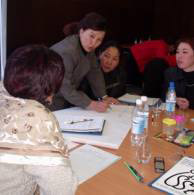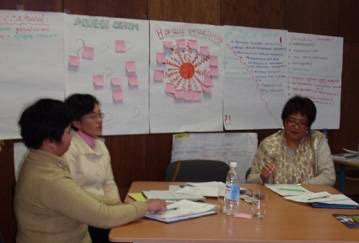Chinara Djumagulova
In Kyrgyzstan, discrimination against children with special needs in the education system is a legacy of the Soviet Union. This system was inflexible, placing children with special needs into institutions depending on their physical or intellectual impairment or family problems. Such isolation made community integration difficult and violated children’s rights. During the post-Soviet transition period in Kyrgyzstan, there has been a reduction in the number of institutions for children with special needs, due mainly to financial constraints. Consequently, such children are often left at home with no education, or placed in mainstream schools without adequate support from teachers and peers. Save the Children UK (SC UK) was asked to assist in tackling this problem in Naryn in 1998. In this article, Chinara explains how SC UK has undertaken a range of activities to promote inclusive education in the context of a post-Soviet country.
In-service teacher training
The main task was to change teachers’ attitudes towards children with special needs, because for so long they had been used to separating them from other children. New skills had to be developed, and I prepared the following training modules:
- Key principles, philosophy and ideological concept of inclusive education: to encourage the perception that children with special needs have a right to education and to be equal members of society.
- Developing training skills of resource teachers, who then train other teachers on inclusive education practices.
- Understanding and responding to children’s needs in inclusive classrooms, based on UNESCO’s guide*:this module supports teachers in identifying the individual needs of each child, developing individual plans, adapting physical classroom environments, applying interactive methods to teaching children with different development levels and interests, and using friendly approaches to children in groups.
- Overcoming barriers to inclusion and changing the lives of children from vulnerable groups: in 1998, disabled children were the more vulnerable, but we have seen increased numbers of children from other marginalised groups who are missing out on education for various reasons.
Since January 2003, we have conducted training for 11 staff members in mainstream schools classified as a ‘pilot professional development schools’ (PDS) and 84 cluster schools across Kyrgyzstan, as a part of a USAID-funded project.

Meeting with colleagues at seminars and sharing their experiences of working with children with special needs encouraged teachers to accept and feel responsible for these children and believe in their ability to develop. Teachers began to realise their role in the development of children. A checklist was developed from observing teachers’ work in mainstream school groups. This was adapted for the mentoring of trained teachers by resource trainers, who:
- support school teachers in applying knowledge and skills obtained through the inclusive education training
- provide recommendations and advice for implementing inclusive education in the classroom, to PDS and cluster school teachers who have completed the full training schedule.
The mentoring process helps teachers to tackle obstacles they face. Perhaps the most difficult problem faced by teachers is overcoming negative attitudes towards children with special needs within the community. Other problems include inaccessible physical environments; lack of skills and facilities for early identification and ongoing assessment of children with special educational needs; lack of appropriate curricula, methods and systems of multi-level assessment; and general lack of knowledge, information, skills, and experience among teachers and parents.
Redesigning the Soviet systems
During the Soviet period ‘Medical-Pedagogical-Commissions (MPC) operated 2-3 times a year, ‘diagnosing’ children with special needs and sending them to institutions. This stopped with the collapse of the Soviet Union. SC UK supported the redesign of the old MPC system, now called ‘Psycho-Medical-Pedagogical-Consultation’ (PMPC). This service has recommended that many children can be supported to learn in mainstream schools. The PMPC has reformed its screening and assessment criteria so as to be socially and not medically-focused. It uses child-friendly methods and its main work is to give consultations on all problems of psychological development of children.
The service supports teachers with the development of individual learning plans. As a result, parents and their children have been given a greater say when deciding future schooling.
Using the Index for Inclusion
Our next step was to develop the use of the Index for Inclusion. This aimed to make schools inclusive by setting new priorities for inclusive school environments in the school development plan; changing policies, practices and culture. Co-ordination groups of teachers, school administrators, parents, and children have been formed in each pilot school. We anticipate that each school will have its own index for inclusion, taking into account its specific needs. This activity will be taken forward in 2006-07 under our USAID grant. Family rooms were also opened for parents to meet each other. They also attend lessons, helping children to learn and adapt themselves to learning with their peers.
University-level training
A course for university students has been created, entitled -Inclusive Education Principles and Practices’. The curriculum of the Special Psychology and Special Pedagogy courses also provide several sessions on inclusive education. In addition, Resource Trainers deliver inclusive education courses to teachers at the professional development and retraining courses of the Kyrgyz Education Academy.
Results

- about 500 children with special needs and learning difficulties are already studying in mainstream schools
- all children, including those with special needs, are benefiting from peer-to-peer interaction and socialisation, and are participating in school and community activities
- all children benefit from the individual approach to learning
- PMPC undertakes child-friendly and regular consultations for children and parents
- children experience more physically accessible environments
- community and teacher awareness has been raised on the rights of children.
Chinara Djumagulova is the Inclusive Education Adviser for Save the Children UK in Kyrgyzstan.
Contact:
27 Logvinenko Street
Bishkek
Kyrgyzstan, 720040.
Email: chinara@scuk.kg
Chinara is a member of the EENET Asia editorial team. EENET Asia is an information sharing network on inclusive education for Central, South and South East Asia. It is committed to the same principles and methods of working as EENET, and is already regularly producing its own regional newsletter. See ‘Regional News’ page.
Since April 2001, SC UK has implemented an inclusive education programme in Uzbekistan, Kyrgyzstan and Tajikistan, supported by NOVIB. The programme aims to respond to the current segregation and discrimination of disabled children and their families in Central Asia, both through the development of alternative community-based approaches to care and education, and through advocacy for the reform of education and social welfare systems and laws. Chinara was the Inclusive Education Adviser for Central Asia, 2002–05, and helped SC UK to publish a set of guidelines: Inclusive Education Development in Central Asia (2004, in English and Russian). The guide draws on the experiences and results of SC UK’s work to develop an inclusive education model, taking into account the context of Central Asia countries.
* UNESCO (2001) Understanding and Responding to Children’s Needs in Inclusive Classrooms: A teacher’s guide, Paris: UNESCO www.unesco.org/education/inclusive
